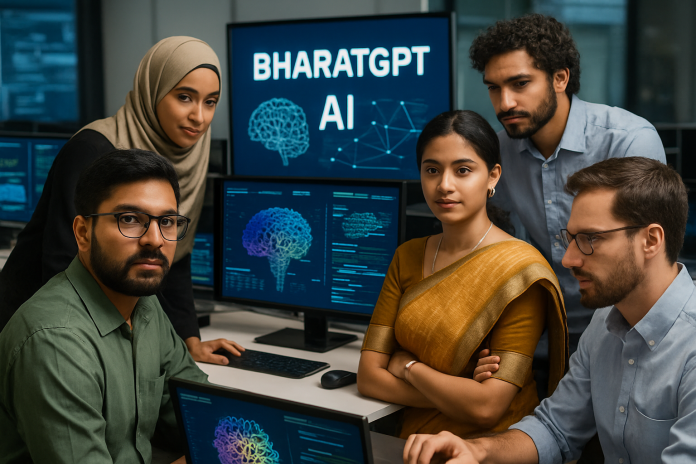India’s ambitious AI sovereignty project targets comprehensive multilingual coverage by 2026 — Sources: IIT Bombay, Government AI Budget — ₹1,500 crore total funding commitment positions the nation among global AI leaders.
Quick Take
- BharatGen receives ₹988.6 crore from India’s national AI budget allocation
- Project targets all 22 scheduled Indian languages by June 2026 timeline
- Param-1 model already processes 5 trillion tokens in English and Hindi
- Infrastructure secured includes 13,640 GPUs for computational capabilities
- Open-source approach aims to democratize AI access across startups
India has launched BharatGen, a government-funded artificial intelligence initiative that represents the country’s biggest move toward technological independence in AI. The project, led by IIT Bombay working with top Indian institutes, has secured ₹988.6 crore from the national AI budget as part of a broader ₹1,500 crore commitment to homegrown AI development.
The scale and ambition of BharatGen puts it on par with India’s most transformative national technology projects. The initiative focuses on developing comprehensive AI models across text, speech, and vision capabilities. The program currently supports nine Indian languages, with plans to cover all 22 scheduled languages by June 2026.
Multilingual AI Foundation Takes Shape
BharatGen’s flagship achievement, the Param-1 large language model, shows the project’s technical strength with coverage spanning 5 trillion tokens across English and Hindi. This bilingual foundation serves as the building block for expanding language support, addressing a critical gap in AI accessibility for India’s diverse population.
The project’s infrastructure development has focused on computational power, securing over 13,640 GPUs to handle the intensive processing requirements of multilingual AI model training. This hardware investment tackles one of India’s main challenges in AI development—limited access to high-performance computing resources.
Strategic Partnerships Drive Innovation
Collaboration with IBM has strengthened BharatGen’s development occurs alongside ongoing discussions, emphasizing inclusivity and transparency in AI development. The partnership goes beyond technical development to include responsible AI practices, which are crucial for government-backed initiatives serving diverse populations.
Leading Indian institutes including IIIT Hyderabad and IIT Madras bring specialized domain expertise, creating a strong talent pool for advancing AI applications in agriculture, finance, healthcare, and governance sectors. These partnerships ensure the project benefits from India’s established academic excellence in technology research.
Open Source Strategy Democratizes Access
BharatGen’s commitment to open-source model availability sets it apart from proprietary AI initiatives globally. The strategy aims to foster innovation among startups and grassroots organizations, ensuring AI developments remain accessible and equitable rather than concentrated among large technology companies.
This approach aligns with India’s broader digital inclusion goals, potentially enabling smaller entities to develop specialized applications using government-funded AI infrastructure. The open-source commitment could speed up AI adoption across sectors traditionally underserved by commercial AI solutions.
Regulatory Framework Development Needed
The initiative highlights India’s current regulatory gap, as the country lacks dedicated AI governance frameworks. BharatGen’s development occurs alongside ongoing discussions about establishing comprehensive AI regulations that balance innovation with ethical considerations and public safety.
Civil society and academic engagement remains crucial for shaping adaptive AI policies that can evolve with technological advancement. The project’s government backing provides an opportunity to establish regulatory precedents for future AI initiatives.
Sectoral Applications Promise Transformation
BharatGen’s potential applications span critical sectors including agriculture, where AI could optimize crop yields and resource management, and healthcare, where multilingual capabilities could improve diagnostic accuracy and treatment accessibility in rural areas.
Governance applications present opportunities for enhanced public service delivery through AI-powered citizen interfaces that operate in local languages. The project’s focus on cultural and linguistic inclusivity addresses fundamental barriers to AI adoption in diverse societies.
Expanding partnerships, including prospective collaborations in Karnataka, position BharatGen to reshape India’s digital infrastructure fundamentally. The initiative represents a strategic investment in technological independence while fostering inclusive AI development that serves the nation’s linguistic and cultural diversity.






